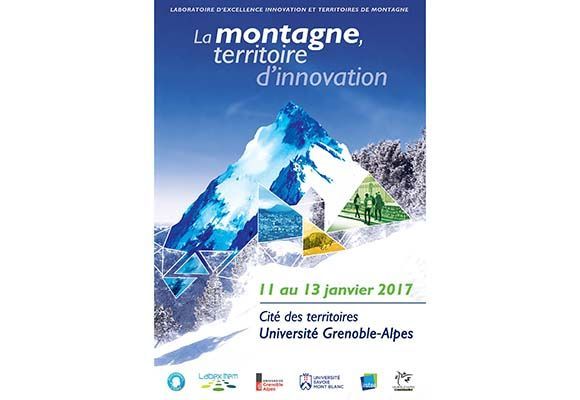Session
Territorial labelling: holding onto heritage and innovating? Putting "distinction" to the test of time
Cité des Territoires - Université Grenoble-Alpes
Du 11/01/2017 au 13/01/2017

Today there is an increasing focus on territorial labelling (or certification). These labels have been extended to all sorts of tangible and intangible objects (quality seals on products, tourism brands, cultural, patrimonial and ecological labels, etc.) that are requisitioned as markers of the territoriality's distinction. The phenomenon has become particularly visible in mountain regions, where these markers have sometimes been established in a highly innovative manner. If we consider the processes involved in territorial distinction on the basis of the "identification, characterisation of the places, to obtain protection and/or notoriety at various scales" (Fournier 2015), these phenomena can be observed as early as the 19th century as a cultural rapport with places and with time. They have been accentuated since the second half of the 20th century with the proliferation of measures for protecting natural and built spaces, and the adoption of competitive reasoning by these territories. In mountain areas, as elsewhere, the quest for distinction is expressed in terms of competitiveness and renewed attractiveness as much as it is in terms of heritage and identity. Now and then, both arguments are called upon within the same projective intention.
This session should serve to confront different analyses of these labelling/certification processes in the light of contemporary changes and their prolonged time frame. The issue of the projective intentions behind these labels and certificates, and the methods adopted to maintain or renew them over time will be central to the session. The underlying objective is therefore to better understand the meaning of developments, and the present craze for acquiring territorial singularity.
We will give preference to:
- Approaches centred on labelling projects and the players involved: their characterisation, their interaction to bring these projects to life, their intentions, their representations of the place and its practices, their expectations in terms of recognition of territorial singularity (expected changes must be qualified), as well as studies on how these processes of distinction are perceived.
- Methodologies for interpreting the current processes of territorial distinction in the long term (e.g. does a labelling approach follow on from older forms of distinction for that same territory, or for a part of it? what are the relationships between these processes in terms of the stakeholders, the objects actually distinguished, intentions, expectations, etc.?).
- Diverse fields of study to obtain a panel of mountain situations, where none are excluded; here the status "mountain territory" is understood as a phenomenological and/or conventional consideration. Attention will be paid to elements which, as part of the processes for distinction and of the underlying territory projects, can identify this "mountain" aspect more specifically.
For this purpose, studies via which these processes can be compared in mountainous and non-mountainous regions will be welcome.
Territorial labelling: holding onto heritage and innovating? Putting "distinction" to the test of time |
||
| Wednesday 11 January | ||
| 14h00 Introduction - présentation de session Karine Basset | ||
| 14h10 - 15h40 - Atelier 1. Patrimoine mondial : quel pouvoir labellisant pour quelle singularité territoriale ? Modératrice : Mélanie DUVAL ; Discutant : Karine Basset |
L'inscription au patrimoine mondial dans les logiques de distinction territoriale. Enseignements à partir des sites palafittiques (approche comparée à l'échelle de l'arc alpin) (World heritage inscription and logics of territorial distinction. Learning from the pile dwellings sites, Alpine Space.) DUVAL Mélanie, BRANCELJ Ana, Edytem, CNRS / USMB |
|
| The territorial labelling of a heritage site in the north eastern Cape Drakensberg, South Africa- the case of the Linton Cave. (L'étiquetage territoriale d'un site du patrimoine dans le nord-est du Cap Drakensberg , Afrique du Sud- cas de Linton Cave) HEATH Gavin , University of KwaZulu-Natal |
||
| Labellisation UNESCO: un projet de territoire transfrontalier? Les cas de l'Espace Mont-Blanc et des Alpes de la Méditerranée (UNESCO's label: a real cross-border project? The cases of Mount-Blanc space and Mediterranean Alps.) JACOB Lauranne, IGEDT, UNIGE |
||
| COFFEE BREAK - 15:40 - 16:00 | ||
| Atelier 2. Labellisation et construction des identités territoriales Modératrice : Véronique Peyrache-Gadeau ; Discutante : Mauricette Fournier |
« Ils Protègent Ma Montagne » « Distinction territoriale » par la labellisation (PnR, Grand Site de France) et changement du rapport des habitants à leur(s) territoire(s) en Sud Morvan contemporain. They Protect My Mountain " Distinction through "space branding" and changing attitudes of the inhabitants' to place belonging in contemporary South Morvan. PIAI Chiara, Environnement, Dynamiques et Territoires de la Montagne (EDYTEM)/Labex ITEM, Université Savoie-Mont Blanc/ Université Grenoble Alpes |
|
| Invention du patrimoine et construction d’une métropole horlogère : L’urbanisme horloger à La Chaux-de-Fonds et au Locle (Heritage invention and metropolis building) NOVARINA Gilles, Architecture Environnement & Cultures Constructives, Institut d'Urbanisme de Grenoble |
||
| L’opportunité d’une labellisation Bretagne Sud : entre reconnaissance par les acteurs et nécessité d’incertitude. (The opportunity of labeling "Bretagne Sud". Between recognition by stakeholders and need of uncertainty) MARINOS Clément, IREA, Institut de Recherche sur les Entreprises et les Administrations (IREA) - UBS , MAHEO Claire, PREFICS, UCO BS , BOUGEARD-DELFOSSE Christine, IREA, UBS , ERTUS Pascale, IREA, UBS , GOURLAY Florence, GEOARCHITECTURE, UBS , BOYER Vincent , IREA, UBS, CHARTAIN Lucile, IREA, PREFICS , DAMAK Leila, IREA, UBS |
||
| Jeudi 12 Janvier | ||
| 10h45 - 12h45 Atelier 3. Labels et marques : activation de la ressource territoriale Modérateur :Véronique Peyrache-Gadeau ; Discutant : Francis Aubert |
Labelling mountain food in Europe: a quality distinction or a way to join forces and strengthen mountain food chains? (Labelliser les produits agro-alimentaires de montagne en Europe: une marque de qualité ou un moyen de mobiliser et renforcer les filières agro-alimentaires de montagne?) DOS SANTOS Alice, Knowledge Technology and Innovation, Wageningen University , VELLEMA Sietze, Knowledge Technology and Innovation, Wageningen University |
|
| Labelliser la forêt et le bois en Chartreuse : garantir la valeur patrimoniale et innover (The Forest and the Wood - label and brand in Chartreuse : guarantee the patrimonial value and innovate) PEYRACHE-GADEAU Véronique, EDYTEM, Université de Savoie Mont-Blanc , BOURHIS Fabien, Parc Naturel Régional de Chartreuse , CHAUVIN Christophe, IRSTEA , TABOURDEAU Antoine, EDYTEM, Université de Savoie Mont-Blanc |
||
ARNOULD Paul, , Ecole normale supérieure de Lyon , GERNIGON Christèle responsable national « Forêt d’exception », Office national des forêts |
||
| Discussions | ||
| LUNCH 12:45 - 14:00 | ||
| 14h00 - 16h00 Atelier 4. La labellisation – logiques d’extension – de tensions et/ou injonction pour les territoires ? Modérateur : Magali Talandier ; Discutant : Chiara Piai |
Les labels et la marque « Valeurs Parc Naturel Régional » dans les Bauges et le Morvan – La singularité territoriale via une cartographie des réseaux internet (Labels and the brand « Valeurs Parc Naturel Régional » in Bauges and Morvan) - Territorial uniqueness via a mapping of Internet networks) CAYLA Nathalie, PEYRACHE-GADEAU Véronique, EDYTEM, Université de Savoie-Mont-Blanc |
|
| Quel modèle économique pour les territoires labellisés ? (What economic model for the labeled territories ?) TALANDIER Magali, PACTE, Université de Grenoble Alpes |
||
| Sans le label, le territoire ? (Without label, territory ?) GUIEU Catherine, Département des Hautes-Alpes |
||
| 16:00 Echanges et conclusions | ||

 Facebook
Facebook Forward
Forward Google+
Google+ LinkedIn
LinkedIn Twitter
Twitter




